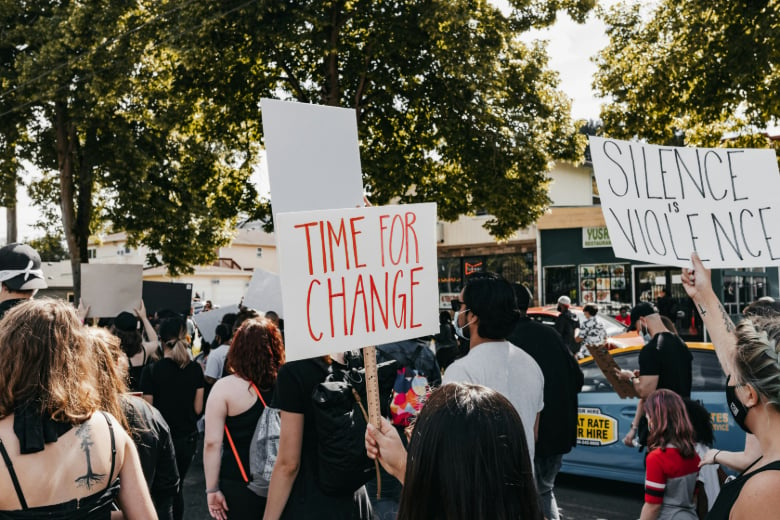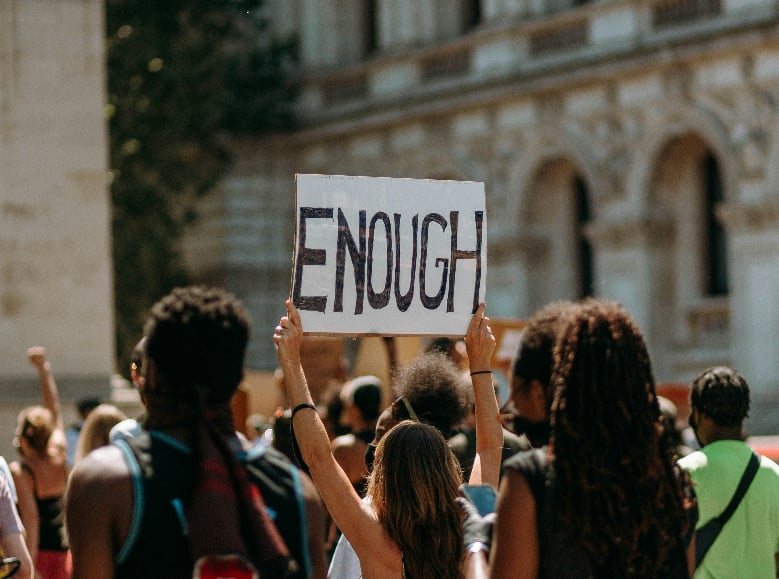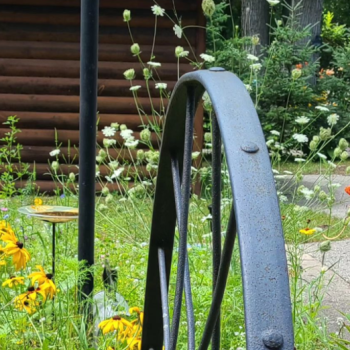I saw the invitation to join the “No Kings” protest this Saturday and immediately felt tied up in knots. I wasn’t sure I wanted to go. Yet I missed the last protest like it, and I did want to attend that one–there are more than a few specific justice issues I want to take a stand on. But the one before that I didn’t want to go. At that time, protesting felt more like I would be throwing a tantrum–how would that help? I thought again about this weekend: Oh yes. It’s also pushing back against Trump’s parade. And although the Grand Military Parade makes me feel squeamish each-time I think about it, I also don’t want people to think I am anti-American if I go to this protest.
As you can tell, I’m on the fence. Sometimes I wonder how to live out my faith in public. I find myself wondering, should Christians protest? It’s a worthy question—and I know I’m not the only one asking it.
I clicked on the link to see where this protest was being held. Ugh. Less than a mile from my house. What were the chances? I asked my kids what they thought. One of my teens lit up: “Oh! I was really hoping to go!” Great. Now how could I say no? Afterall, I’m the author of Justice-Minded Kids—it would be hypocritical to not dive into this parenting opportunity. My husband could stay home with our littlest, who otherwise would be darting into traffic. No excuses there. I guess I really had to face my inner tension.

Do You Have a History With Protesting?
I’ve gone to protests before. As a kid I was brought along to a few evangelical culture-war pro-life protests. I had fun yelling, “Everyone love Jesus! And Jesus loves everyone!” I was great at this protesting thing! Only as an adult did I start to question what message we were really sending. Maybe I meant to share love, but I doubt anyone watching us understood it that way.
As a young mom working in the anti-trafficking movement I participated in No More Slavery rallies in downtown D.C. I even brought my little kids. They were safe, bipartisan, and I felt confident Jesus would approve. More importantly, we weren’t upsetting anyone. We were just raising awareness. Was that really a protest, then?
Then In 2020, I kinda joined a protest. I drove past one, at least. I drove by multiple times, honking my horn in support. Honestly, I was afraid of getting COVID-19. I am immunosuppressant. Later, during our Kindness Quest, we joined another crowd, but only to pass out Gatorade and ice water.
Our experience with protesting obviously affects how I am considering it now. I have other friends who talk with me about Vietnam War protests–it seems their experiences have shaped them too. But regardless of our experiences, we can’t let these get in the way of what God is guiding us in now.
Arguments Against Christians Protesting
Why do Christians avoid protesting? These are things I’ve thought and what I’ve heard others say. Maybe you’ve heard them too:
- Jesus didn’t protest the Roman Empire—He paid taxes!
- Even peaceful protests can appear unloving.
- Christians are supposed to be peace-keepers, and protests feel like the opposite.
- We’re supposed to protect our kids—we can’t bring them into this
- We should submit to and pray for our leaders, not protest them.
- Protesting demonstrated that our hope is in government, not God.
But when I look to Scripture, many of these arguments don’t hold up.
Take Jesus’ triumphal entry—it certainly looked like a protest to the Roman authorities and the Jewish people. Or His cleansing of the Temple, the most public space of His world. He flipped tables, challenging the spirit of capitalism in a sacred space. He quoted Scripture about how the Temple was meant to be a house of prayer for all people—including the outsiders who this particular space was designed to welcome.
And aren’t we supposed to please God, not man? If we genuinely act with love and nonviolence, but others still judge us, our accountability is to God, not them. We’re not called to maintain false peace, but to pursue shalom—true, holistic peace that includes justice, flourishing, and reconciliation. If a protest moves us toward shalom, shouldn’t we show up?
I’ve used my kids as an excuse not to go—and sometimes, that’s valid. But we can share the burden by helping each other with childcare. And older kids need to experience these moments. They’re chances to build courage, consider convictions, and practice real-world faith.
Also, protesting isn’t illegal. It’s a protected right in this country. And praying for our leaders doesn’t exclude speaking up. In fact, prayer should be part of our protest.
Then, this brings up an even harder question: when should we defy authority? Christians now widely condemn those who passively submitted to the Nazi regime and we honor those who risked everything to protect the vulnerable. At some point, we must prioritize loving our neighbor over obeying unjust laws—just like the Good Samaritan did when the religious leaders walked by (who were following the law).
However, the argument that resonates most with me is the last one: I belong first to God’s Kingdom, not any kingdom of this world. I don’t want to fall into Christian Nationalism—not in either direction. Our political system, broken as it is, won’t save us. Jesus will. Our hope is in Him.
But does that mean we sit on the sidelines? When I go to a protest, I can still remember my hope is in God. I can plant seeds of shalom in the city where I live, just as God told His exiled people in Babylon to do. (Jeremiah 29)
Arguments That Christians Should Protest
When I shifted my question from “Should Christians protest?” to “Why might Christians protest?” the answers came more easily:
- Protesting can be nonviolent and respectful.
- It’s a legal, civic expression—often encouraged by representatives.
- It’s a way to love my neighbor through action and solidarity.
- It offers a public witness to God’s values.
- It models courage and conviction for my kids and others.
- It creates connections with people disillusioned by God or the Church.
- It prompts real-time prayer for our leaders, nation, and spiritual authorities that the Bible says we wage war against–the real enemy.
- It builds my confidence to boldly stand for what matters in the future.
- It sharpens my awareness so I’m not complacent in the face of injustice.
In the end, I realized the tension I feel isn’t mostly about the protest—it’s about perception. I worry about what others will think. They won’t know my motives. I’m afraid of being associated with the “wrong” people.
I wonder if Jesus ever felt this tension, too, when inviting notorious people to his dinner parties. Regardless, he didn’t value other’s opinions and did what was right, regardless.

Before You Protest: A Quick Guide
If you’re considering attending a protest—especially as a Christian—here are a few things to consider:
- Know you “why”: Name one or more very specific reasons why you’re protesting
- Buddy up! Go with a friend and tell someone where you’ll be.
- Brush up on the principles of nonviolent protest.
- Have a way to ground yourself if emotions run high—like breathwork, an exercise, or a prayer.
- If bringing kids, talk intentionally about what’s happening and why.
- Keep a note to jot down things to fact-check later so you don’t spread misinformation.
- Be ready with one clear take-away action you can recommend to any asking observer.
- Save emergency numbers and know your legal rights (and those of others there) in case things go sideways.
- Determine your own boundaries: when will it be time to head home?
- And, as you are a Christian, PRAY!
Are You Going to a Protest?
Protesting is just one of dozens of ways to practice justice, and maybe it isn’t for everyone. But sometimes it is necessary. It’s okay to feel conflicted about it. But don’t let fear, uncertainty, or perception stop you from standing for what is right.
As for me? I’ll probably be at the protest this Saturday—still full of questions, and probably a little anxious. But I know who I am first, and that isn’t a citizen of this nation, but a follower of Jesus who seeks shalom for all.













